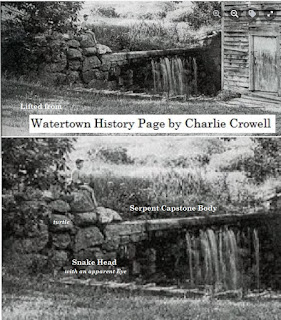Another Sort of "Water Wall"
I took a little walk. I even stayed on the path until the hill turned steep, until the sound of the river called me to it – well, after I wandered off a little to look at the zigzag rows of stones still partially visible under the messy piles of stones dumped on them. I ended up by some of the last remaining rows of stones on that I’m pretty convinced are retaining walls for an Indigenous foot path – a causeway if you will.
A “Colonial
Construction related to the Cleveland Grist Mill” another person might
conclude, but the Indigenous Iconography and other observations as well as location make me think
otherwise. There is no reason I can think of any sort of practical purpose I
can think of to build something like this a half mile downstream from the actual
mill and dam. This is an early mill, for grinding grain, from sometime around
1700. For some time now, I suspect the dam to contain Indigenous Iconography
very similar to the Indigenous stonework at my family home of the last forty
years. Right in front of the house for example, the top course of stone closely
resembles a European capstone, the stones were dressed so as to resemble big
snakes.
Refreshing my
memory about the mill itself, I perused some photos collected by Watertown CT Historian
Charlie Crowell and shamelessly lifted several photos. I was totally surprised
to find this one:
I took about my
tenth look at this “new to me” photo and then made a crop of the now missing
stonework to look for “snakes and turtles” in the stonework. Sometimes it seems
to take that one effigy to come into focus before you just can’t stop seeing
the others.
Well now, so it
would seem, the capstone on the top of the dam, over which the water flowed,
very much resembled the capstone snakes here at home…





I'm always learning from your blog.
ReplyDelete